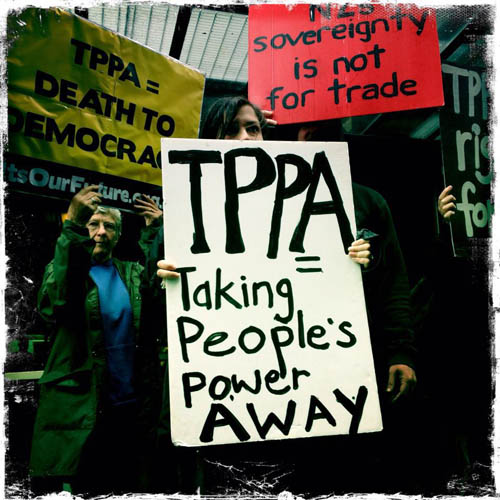Couldn't happen here?
Australia's plain packaging laws were unsuccessfully challenged by tobacco giant Philip Morris in Australia's High Court. But not to be beaten, Philip Morris immediately registered as a Hong Kong company and has now sued Australia under a 1994 investment agreement between Australia and Hong Kong that unfortunately included ISDS provisions. Philip Morris may win millions of dollars in compensation from Australia as a result.
Unless Australia stands fast and refuses inclusion of ISDS provisions in the TPPA, there will be significant disincentive for any new public interest regulation that Australia may democratically determine to be necessary in the future – whatever the government.
Pulitzer prize journalist Chris Hedges describes this sort of corporate power play as 'a corporate coup d'état in slow-motion,' while Dr Patricia Ranald, Convenor, Australian Fair Trade and Investment Network (AFTINET) warns: 'Investor state dispute rights are a threat to national democracy and sovereignty, and should continue to be excluded from all trade and investment agreements.'
Sheldon Wolin, American political philosopher and writer on contemporary American politics, goes further:
'Through the anonymity of the corporate state we get inverted totalitarianism - you have corporate forces that purport to be loyal to the Constitution, electoral politics, the iconography and language of American patriotism, and yet internally have seized all of the levers of power to render the citizen impotent.'
The potential danger inherent in this corporate attack on our sovereignty is why the current Labor Government, supported by the Greens, decided that it could not accept ISDS provisions in any future free trade agreements.
Nevertheless, with a willing Coalition expecting election victory, this 'corporate death star' is accelerating towards us - refined through earlier free trade agreements such as NAFTA and now close to reaching its ultimate form in the controversial Trans Pacific Partnership Agreement.
Currently in its final negotiation stages, the TPPA includes 12 participating Pacific Rim nations: the US, Australia, Canada, New Zealand, Malaysia, Vietnam, Japan, Peru, Mexico, Chile, Brunei and Singapore. Others are set to join. US pressure means this may be signed off by October this year.
Detailed information about the TPPA model is limited because it is being progressed in the utmost secrecy. But knowledge of earlier free trade agreements (NAFTA, ANDEANFTA) along with critical Wiki leaks coming out of the TPPA negotiations together provide important insights - particularly into the likely power of its ISDS weaponry.
The TPPA will be equipped with the ultimate in clever legal firepower for transnationals wanting to overcome regulatory barriers to their profit-making in the nations that have signed on to the free trade agreement. Free trade agreements are essentially about leveling the playing field across all participating countries so that corporate expectations around environmental and other public interest regulation are the same wherever they operate. Any adjustments or variations beyond or away from the standards signed off in the FTA are open to challenge by transnationals in an off-shore tribunal.
This may well apply for the rest of this century, as Professor Jane Kelsey, Faculty of Law, University of Auckland warns us: 'The TPPA will lock future governments into a failed regime where markets rule for the next 100 years.'
The ISDS provisions enable transnational corporations to sit above national sovereignty and side-step the legal and democratic processes of each participating nation by shifting disputes over environmental regulations out to an untouchable off-shore tribunal operating under its own rules, using corporate lawyers as the adjudicating panel.
Under the ISDS provisions, environmental campaigners will be left out of the loop and can have no right of appeal - not even through the normal democratic processes of their country. Furthermore, the tribunal process is held in secret, it may go on for years, cost millions, and even if the government wins, under the rules it may not be awarded costs.
Six hundred corporations are driving the TPPA process in Washington. These include the biggest transnational corporations such as the Bank of America, JPMorgan, Pfizer, Monsanto, Chevron Oil, Exxon Mobil, Dow Chemical, Cargill, WalMart, and Philip Morris Tobacco. The TPP is being drafted of, by and for the transnational corporations
In the US, the powerful corporate lobby position on the Australian Labor Government's refusal to accept the inclusion of ISDS provisions is, quote: 'American companies should be able to side-step the Australian legal system in the event of certain legal disputes'.
.
So why would nations like Brunei, Vietnam, Chile and New Zealand agree to the inclusion of ISDS provisions? The answer is simple: they are attracted to the potential of tariff-free trade with the US – a huge market. To get that they are prepared to accept the bitter pill of 'regulatory chill' – particularly so if they are also led by conservative governments which are ideologically supportive of market determinism and generally disinclined to go big on public interest legislation in their own country.
But Coalition governments in Australia don't have to accept ISDS provisions in free trade agreements. Recognising their serious threat to Australia's sovereignty, in 2004 John Howard refused to accept the inclusion of ISDS provisions when he signed the AUSFTA (Australia-US) free trade agreement.
So the question is, why is Tony Abbott so keen to include them?
The right wing Institute of Public Affairs – the major think tank associated with the Liberal Party – has developed a list of 75 key policy changes that it believes the Coalition should rapidly adopt, if elected to government on September 7.
While maintaining a small target election strategy, the Coalition has nevertheless adopted a significant number of the electorally easier items on the IPA wish list, including:
repealing the carbon tax;
abolishing the Department of Climate Change;
abolishing the Clean Energy Fund;
Introducing a special economic zone in the north of Australia including:
a) lower personal income tax for residents
b) significantly expanded 457 Visa programs for workers
c) encouraging the construction of dams; devolving environmental approvals for major projects to the states; repealing the mining tax and reducing the size of the public service.
Many of the remaining IPA items are more controversial in the Australian electoral context, and have been omitted from the Coalition conversation as the election approaches.
These align perfectly with the operational requirements of the TPPA and equate with the objectives of the transnationals driving the inclusion of ISDS provisions.
They include repealing the Fair Work Act, removing all remaining tariff and non-tariff barriers to international trade, ending all public subsidies to sport and the arts; ending all hidden protectionist measures, such as preferences for local manufacturers in government tendering, eliminating media ownership restrictions, regulatory reduction, repealing plain packaging for cigarettes and removing food labeling, repealing the alcopops tax and privatising Australia Post, Medibank, the ABC and SBS.
Could Tony Abbott avoid the charge of not seeking a mandate for these policies by introducing them under the cover of the TPPA? Fast-tracking the TPPA with ISDS inclusions as early as October this year would provide the perfect mechanism for introducing these draconian policies out of 'necessity' – in order to comply with the operational requirements of the TPPA - and because the 'benefits' to the economy that might flow from a free trade agreement of this size ostensibly will increase productivity.
These justifications will be amplified by the Coalition's promised 'Commission of Audit' into the nation's finances. Routinely trotted out by newly elected conservative governments, this as usual will be designed to paint a picture of doom and gloom requiring drastic measures to bail Australia out.
The environment movement in this country has been asleep on this issue, and the coming federal election may be our last chance to stop it. The full text of Pulitzer prize journalist Chris Hedges corporate power comment, quoted above, actually goes a bit further:
'We've undergone a corporate coup d'état in slow-motion. And it's over. They've won.'
Let's hope for the sake of the environment that he is wrong.
This article has been written by LACA member Barry Fitzpatrick for ECO environmental newspaper published by SCEC Sunshine Coast Environment Council and is reproduced here with permission.
Many other countries 'invited' to TPPA are also unhappy with arrangements. Click on image above to go to http://thedailyblog.co.nz/2013/07/15/tppa-represents-privatisation-of-state-power-at-its-worst/ which discusses issue from NewZealand perspective.
Links to other articles and relating to TPPA
http://najistppa.org/what-is-tppa.html
http://aftinet.org.au/cms/sites/default/files/Pollies%20breifing%20election%20%200713.pdf
http://www.itsourfuture.org.nz/wp-content/uploads/2012/09/TPP_factsheet_ISDS_2_page.pdf
http://aftinet.org.au/cms/campaigns

